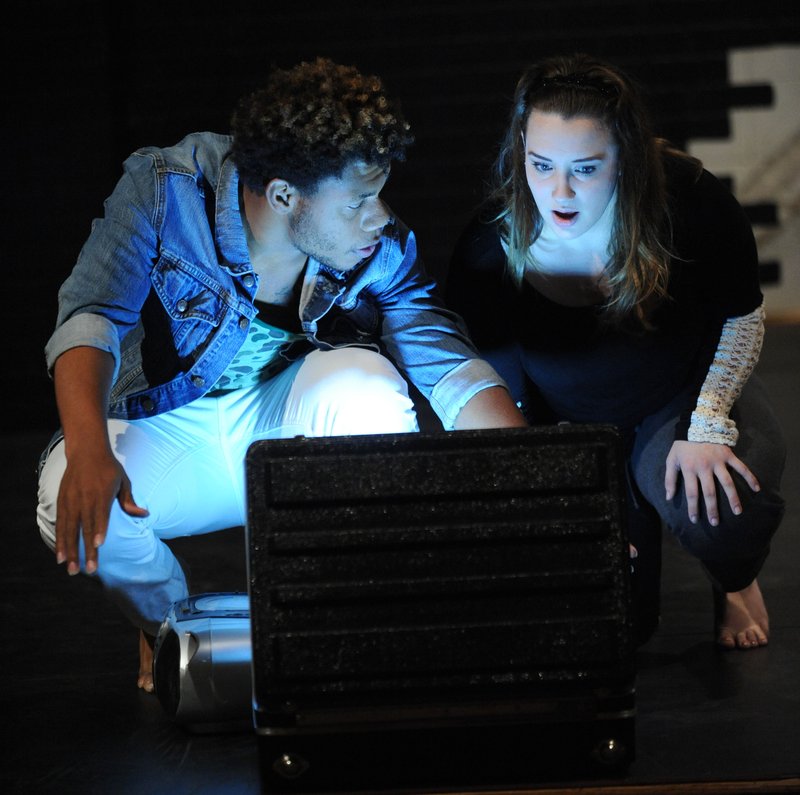When "Angels in America, Part One: Millennium Approaches" premiered on Broadway, Frank Rich of The New York Times said that playwright Tony Kushner's script "speaks so powerfully because something far larger and more urgent than the future of the theater is at stake. It really is history that Mr. Kushner intends to crack open." Now, over two decades later, the University of Arkansas Department of Theater is cracking history open once more to see what has -- and hasn't -- changed in Kushner's quick-paced and lyrical examination of American life.
"We're at the 25th anniversary of its world premiere," says Cole Wimpee, director of the new production at the Global Campus Theater on the Fayetteville square. "So [given] a lot of the issues that the play was addressing when it premiered ... it felt like a really good time, right on the eve of [the 2016 presidential] election, to look at the play with new eyes.
FAQ
‘Angels in America’
WHEN — 7:30 p.m. Oct. 20-22; 2 p.m. Oct. 23
WHERE — University of Arkansas Global Campus Theatre, 2 E. Center St. in Fayetteville
COST — $5-$10
INFO — 575-4752
"[It is one of] the most important American plays of the last 30 or 40 years. A lot of the issues in this play are still very relevant, not only to society, but as a whole to this community -- to Fayetteville and Northwest Arkansas."
"Angels in America, Part One: Millennium Approaches," which won both the Pulitzer Prize for Drama and the Tony for Best Play in 1993, uses multiple characters -- some supernatural -- to tell the story of what it meant to be gay in Reagan's America, at the height of the AIDS epidemic in 1985.
But multiple themes makes the play relatable to a wide swath of audience, says Wimpee.
"Religion in society, justice, equality," he lists. "["Angels"] brings up a lot of things in American history: the Civil War, the Cold War, Joe McCarthy and the anti-Communist trials in the '50s. So there's this message: 'Look at what's happened in the last 30 years, history repeats itself,' and here we are, doing this play 25 years later, and history is once again repeating itself. We need to constantly remind ourselves and educate ourselves about the issues society faces and how we can create, in as many ways as we can, a more fair and just society."
Wimpee sees opportunities for community outreach through the various topics of the play.
"In terms of public health, HIV rates have spiked a lot in the last few years, not only in this area but in the state as a whole," he notes. "We're going to do HIV testing here in the lobby -- we're really trying to get past the stigma of getting tested. And the play has a major character who has anxiety issues and is abusing prescription drugs, so we're going to have a table out here that offers resources for anxiety and stress relief.
"We're trying to view the play as a bridge to talk about personal and community issues that could really use some more open discussion and open dialogue."
To encourage that dialogue, there will be an open forum at 5 p.m. Oct. 22 prior to the show.
"We're having a few different people from different organizations in public health, advocacy and even politics come in and talk a little bit here about what they see in the play and how they connect those issues to our community."
Trey Smith, who plays Belize -- whom Smith describes as the play's "moral compass" -- sees the benefit in bringing these sometimes-sensitive subjects out of the closet.
"[This show] brings to light a lot of issues, and it doesn't hide them," he says. "I think, in order to fix things, the first step is to acknowledge that there's a problem. If we're going to get past discrimination as a society, we can't pretend it doesn't exist. We have to deal with [it]. That's what you have to do in order to get anywhere."
Actor Chris Tennison, who plays Roy Cohn, says he hopes audience members "take away an awareness of the struggle, and awareness of how an entire society treated its own people, and uses that awareness to take a look at our own lives, and our own culture, and our own society.
"I think it's kind of prescient that we're doing this so close to an election that could, in fact, impact our country in the way this story did. There are decisions that are going to require an awareness of all of us as a people."
NAN What's Up on 10/14/2016

